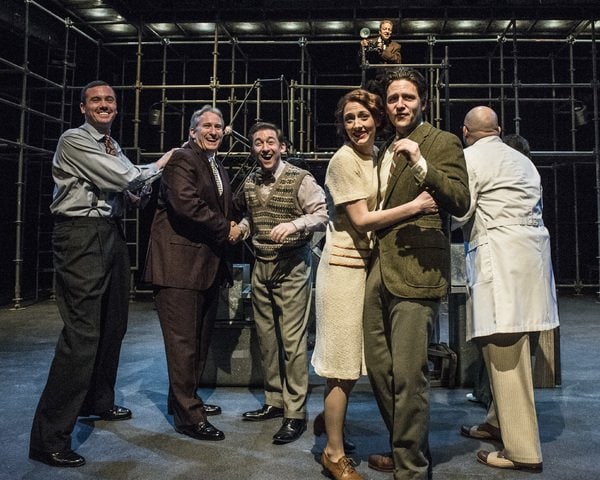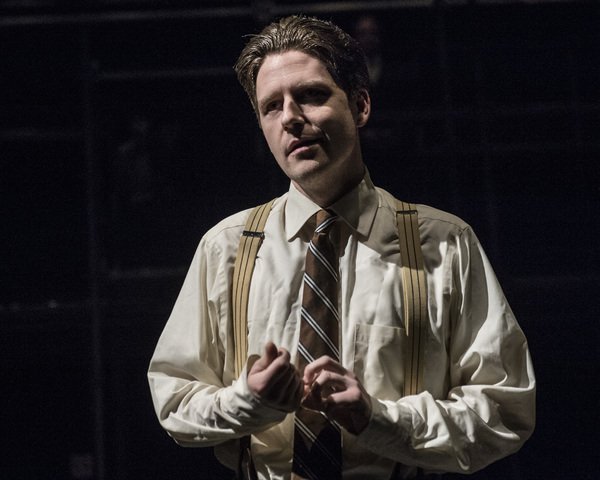In 1920, a fourteen-year-old boy in Idaho, named Philo Farnsworth, asked his science teacher for advice on a design he was working on for an electronic television system. Seven years later, that kid would grow up to be the first to send a fully electronic image transmission. Farnsworth was undeniably brilliant, but a bigger man with better resources, RCA media mogul David Sarnoff, had been tracking Farnsworth’s progress and working tirelessly to beat him to the invention.

Aaron Sorkin, well-known writer of projects like The West Wing and The Social Network, took this bit of history and created The Farnsworth Invention, a play which follows the paths of Farnsworth and Sarnoff in their race to discovery and the ensuing battle over patents, to determine who was the recognized inventor of the television.
1st Stage recently opened their production of The Farnsworth Invention, with Director Alex Levy-who also serves as 1st Stage’s Artistic Director- at the helm. Levy uses a cast of fourteen actors to play about seventy-five roles in the fascinating story of the invention that forever changed the way media and information are consumed.
Kathryn Kawecki’s set design consists of two-story scaffolding on an otherwise empty stage. The actors bring on various props (designed by Cindy Jacobs) and stack them in different ways to represent relevant items for each scene (a long wooden-framed window and a couple of suitcases made a table). The seemingly simple design was perfect for a show that covers so much time and space, moving from scene to scene with no pauses in the action.
Completing the setting was music composed by Ethan Balis (who was also in charge of sound design). The play’s soundtrack was a character in and of itself, playing subtly in the background, never overpowering the dialogue but aiding to shape the mood of each scene.
At the center of the story are Philo Farnsworth and David Sarnoff played by Sam Ludwig and Jonathan Lee Taylor respectively. The two men serve as “unreliable narrators,” each speaking from their own personal point of view, with tweaks and omissions to reflect the way they want history to remember the series of events.
Sarnoff is not your average antagonist. He is the Goliath to Farnsworth’s David and Taylor plays him with ruthless ambition. Still, there’s a hint of sorrow and guilt in his performance that allows the audience to sympathize with his character and not simply dismiss him as a villain.
Sarnoff has had his own hardships. His family is Jewish, which created its own set of obstacles in the 20s, and Sarnoff was a young boy when he came to America. He worked his way from the ground up in the business world and that incredible drive and determination is what got him to his bigwig status, but his need for power and control eventually overcame his sense of humanity.
Having the advantage of hindsight in recounting the story, Taylor captures Sarnoff’s desperation to not only prove that his company invented television but that the accomplishment was achieved fairly and without deception.
Farnsworth, on the other hand, is driven by the passion of discovery and Ludwig exudes the character’s electric excitement for his ideas. Those around Farnsworth cannot help but believe that it is not a matter of if the television can be completed, merely a matter of when. And this unfaltering confidence, coupled with his genius, helps him secure the support and financial backing of Leslie Gorrell (Liz Mamana) and George Everson (Jacob Yeh). The two agree to help Farnsworth and bring him to the attention of banker Bill Crocker (Michael Crowley), who ultimately provides the bulk of the funds to set up a makeshift laboratory.

Farnsworth creates a team that consists of his sister Agnes (Caroline Wolfson), brother-in-law Cliff (Gary Dubreuil), and a refrigerator repairman (Frank Britton) – none of whom have any expertise in the field of communications. Along with his wife, Pem (Amanda Forstrom), Farnsworth dives into his project and the race against time begins.
It is hard to imagine, in our current world of innumerable electronic devices that continuously advance in design and function faster than the wider population can afford to buy them, the impact of an advancement like the television. But the overall design of the show, with the performance of the cast, brings a full and complete picture to life that easily transports the audience into the world of the play.
With many of the actors playing multiple parts from one scene to the next with no blackouts, there was no time for costume changes. But by the design of Danielle Preston, costumes consisted of mostly muted colors, which helped the believability of the sudden transitions. Small pieces were occasionally added or taken away but mostly the change from one character into another was accomplished with stage direction and acting prowess.
Also worth noting is the necessity of the play’s fast pace. The process of the television’s creation is complicated, to say the least, and the potential to lose the audience in a sea of jargon is high. Add to that the fact that the show is more than half exposition due to the nature of dueling narrators, and the show runs the risk of dragging and being too information heavy. But there was never a lull in this production, with Taylor and Ludwig constantly guiding the energy onward through the story, focusing more on the human interactions rather than mechanics.
Sorkin’s play The Farnsworth Invention is not an easy undertaking: the script is primarily narration, the material is technically complicated, and there are myriad characters and locations in the show. But 1st Stage has brought together an incredibly talented cast and creative team and produced a magnificent piece of intellectual theater.
1st Stage’s production of The Farnsworth Invention is not a high-action show, but Taylor and Ludwig’s performances are downright captivating, bringing you to the edge of your seat like you’re watching a high-speed car chase, fueled by their desperation to succeed, leaving you energized and inspired to tackle your own life’s goals.
Running Time: Two hours, with one 10 minute intermission.
The Farnsworth Invention plays through March 11, 2018, at 1st Stage in Tysons Corner — 1524 Spring Hill Road, in McLean, VA. For tickets, call the box office at (703) 854-1856, or purchase them online.




